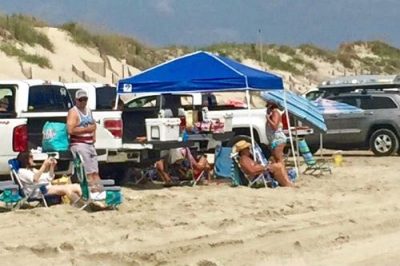CURRITUCK COUNTY – Perhaps the ultimate irony for Carova, a tiny Outer Banks community with no paved roads, is that every summer its wide beach becomes a parking lot – a long, crowded one.

At the height of the season, thousands of off-road vehicles a day drive along an 11-mile stretch of shoreline, navigating past thousands of beachgoers and their vehicles squeezed on the strand of soft sand between ocean and dunes.
Supporter Spotlight
In an effort to address safety concerns and control the number of parked vehicles, the county, during this past Memorial Day weekend, implemented a new ordinance requiring out-of-town vehicles to pay for a parking permit, while exempting Currituck residents and nonresident property owners. Within weeks, the Virginia Four Wheel Drive Association sued the county, contending that charging a fee only to nonresidents was unconstitutional.
Last week, a judge turned down the group’s request filed June 21 for a preliminary injunction that would have halted the permit requirement until the case was resolved.
But the debate that led to the dispute lives on.
“Of course we are disappointed that the judge did not issue an immediate injunction, but as the judge said, it has no reflection upon the merits of the case,” the group’s vice president, Sandy Schneirla, said in a statement provided by the association’s Washington, North Carolina-based attorney, Edwin Hardy.
“After hearing the arguments in court of both sides,” the statement continued, “we are more confident than ever that we will prevail when the case is finally heard on the merits of the constitutional issue.”
Supporter Spotlight
Driving up the beach is the only way to access the 3,000 platted lots in the community, most of which are located off sand roads behind the dune line and remain undeveloped. Although only 200 or so people live year-round in Carova – the name is a blending of Carolina and Virginia – the beach explodes with day-trippers and vacationers in the summer.
A beach driving committee appointed by the county in 2011, when 1,242 vehicles were counted on a July day, had recommended the parking permit system, but the ordinance was not approved until March 5.
Nontransferable permits are assigned at no cost to each vehicle driven by a resident or Carova property owner, covering Memorial Day weekend through Labor Day weekend. Nonresidents are charged $50 per vehicle for a 10-day permit. Two seasonal guest permits are also allotted at no cost for each household in a rental program, and two free unassigned guest parking passes are provided to full-time residents in the off-road area.
Currituck County has until Aug. 20 to respond to the complaint, but county attorney Ike McRee said the implication of an unfair burden to nonresidents overlooks that county residents, through their taxes, are already paying their share.
McRee said that the permit requirement does not prevent visitors without a permit from driving on the beach. Also, he said it is not unusual for certain fees to be lower for local users of a service or program.
One example of a local benefit he cited is that the town of Southern Shores issues parking permits only to town residents.
“There are a number of cities and counties that charge different fees for recreational programs, depending if you are a resident of that locality,” he said.
County manager Dan Scanlon vowed in a statement to “vigorously defend” the ordinance and to “continue to work towards the enhancement of public safety on the north beach.”

But Scanlon acknowledged in an interview that the new permit system has been controversial, and he has received a number of complaints. He has also heard from Carova residents who applaud it.
“I guess the comments I’ve heard have run the gamut – that it’s working smoothly to it’s not working at all,” he said.
Some tweaks will likely be made later this year, he said, when the county board of commissioners plans to meet with the sheriff’s office to review issues, pro and con. For instance, Scanlon said, it may make sense to adjust the distribution of passes for rental programs.
At least one property owner agrees.
“The only negative thing I have to say about it,” said Tom Huduk, a Swan Beach property owner for 48 years, “is that a seasonal resident like myself … can’t get guest passes that aren’t assigned to a vehicle.”
Hudak, who lives in New Jersey, said he asked for a waiver, but was turned down, “which I think is discriminatory to the seasonal residents” since he pays the same taxes.
Carova has gone through head-spinning growth in tourism, helped partly by the county’s successful marketing campaign focused on the free-roaming wild horses and the undeveloped beach.
Less than 15 years ago, the northernmost end of the Outer Banks beyond the paved road in Corolla was still isolated and mostly ignored by tourists. But with the growing popularity of off-road wild horse tours and adventure tourism, visitation soon exploded.
Inevitably, more conflicts developed between beachgoers, homeowners, vehicles and the horses. In recent years, the county has put more limits on horse tours to reduce stress on the roads, the animals and the community. As a result, residents have taken to staying home as much as possible to avoid crowds. That can make some a little impatient when out-of-towners challenge measures that are trying to address the problem.
“Why doesn’t Virginia Beach allow them to drive in the sand in Sandbridge?” Connie Johnson, a Carova Beach resident who works in Corolla, asked about the plaintiffs and the beach community across the state line on Currituck Banks. “Why not fight with their own city?”
Beach driving is no longer permitted in Virginia Beach. But Johnson, who was born and raised there, said she remembers when people routinely drove back and forth over the state line on the beach, until a gate was installed in 1979. Now that 10-mile trip has become a three-hour trek.
With that eyewitness experience, Johnson understands the appeal of Carova’s rugged coastal environment and pristine, off-the-beaten-track beaches. A property owner since 1995 and full-time resident since 2005, she said that traffic in Carova has grown exponentially in the last five years, and the parking permit does not appear to have alleviated the congestion.
“There are just so many vehicles,” Johnson said. “I think the solution is a driving permit.”
For the time being, Johnson said that baby steps may be the best to expect, and she believes the community gets it.
“I think they’re glad that something is being done,” she said.







